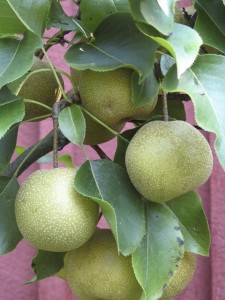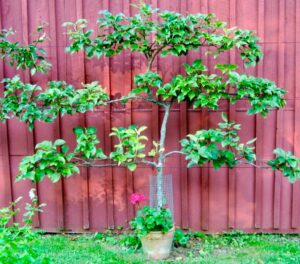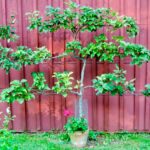 I looked up from weeding the vegetable beds a few weeks back to see that half the pears on our espaliered pear trees that we’d trained against the side of the barn were gone. Branches that had been drooping with fruit just the day before had been stripped bare, a bountiful harvest of Bartlett pears vanishing into thin air overnight. Occasionally, in the past, we’d find a half-eaten, partially ripened pear on the ground under the trees, the work of the chipmunks who’ll try anything once, even the eggplant I discovered, still on its vine, covered in disgruntled t0othmarks. But the pear theft was more like a heist, a clean, professional sweep of the goods with no sign of the culprit or how the sting was pulled off. Interestingly, though, only the Bartlett pears were stolen. Our tree of Asian pears was left untouched.
I looked up from weeding the vegetable beds a few weeks back to see that half the pears on our espaliered pear trees that we’d trained against the side of the barn were gone. Branches that had been drooping with fruit just the day before had been stripped bare, a bountiful harvest of Bartlett pears vanishing into thin air overnight. Occasionally, in the past, we’d find a half-eaten, partially ripened pear on the ground under the trees, the work of the chipmunks who’ll try anything once, even the eggplant I discovered, still on its vine, covered in disgruntled t0othmarks. But the pear theft was more like a heist, a clean, professional sweep of the goods with no sign of the culprit or how the sting was pulled off. Interestingly, though, only the Bartlett pears were stolen. Our tree of Asian pears was left untouched.
I’d managed to put the burglary behind me when, a few days later, I noticed an odd rustling in the Asian pear tree — and realized that most of that fruit, too, had now disappeared. Looking closer, I saw a saw a bushy tail swishing  among the leaves, and then a plump gray squirrel tiptoeing along the espalier wire with all the grace and daring of Philippe Petit. He had a perfectly round and ripened Asian pear clenched between his teeth. When I yelled at him to drop it, he gave me a pitying look and scampered off. Only half a dozen pears remained on the vine. It’s hard not to admire a job well done. I left them for the thief, and they were gone by morning.
among the leaves, and then a plump gray squirrel tiptoeing along the espalier wire with all the grace and daring of Philippe Petit. He had a perfectly round and ripened Asian pear clenched between his teeth. When I yelled at him to drop it, he gave me a pitying look and scampered off. Only half a dozen pears remained on the vine. It’s hard not to admire a job well done. I left them for the thief, and they were gone by morning.
I love this long, leisurely poem which so beautifully lays out the case for pears over apples. I can almost taste the crisp sweet flesh of all those pears we lost this summer.
Pear
By Paisley Rekdal
after Susan Stewart
No one ever died for a bite
of one, or came back from the dead
for a single taste: the cool flesh
cellular or stony, white
as the belly of the winter hare
or a doe’s scut, flicking,
before she mates. Even an unripe one
is delicious, its crisp bite cleaner
almost than water and its many names
just as inviting: Bartlett and Comice,
Anjou, Nashi, Concorde
and Seckel, the pomegranate-skinned
Starkrimson, even the medieval
Bosc, which looks like it dropped
from an oil painting. It is not a sin
to eat one, though you may think
of a woman’s body as you do it,
the bell-shaped swell of it
rich in your hand, and for this reason
it was sacred to Venus, Juno, all women
celebrated or dismissed
in its shape, that mealy sweetness
tunneling from its center, a gold
that sinks back into itself with age.
To ripen a pear, wrap it in paper,
lay it in cloth by an open window
or slip a rotten one beside it
on a metal dish: dying cells call always
to the fresh ones, the body’s
siren song that, having heard
it once, we can’t stop singing.
This is not the fruit
that will send you to hell
nor keep you there;
it will not give you knowledge,
childbirth, power, or love;
you won’t know more pain
for having eaten one, or choke
on a bite to fall asleep
under glass. It has no use
for archer or hero, though
anything you desire from an apple
you can do with the pear, like a dark sister
with whom you might live out
your secret desires. Cook it
in wine, mull it with spices, roast it
with honey and cloves. Time sweetens
and we taste it, so gather the fruit
weeks before ripeness,
let summer and winter both
simmer inside, for it is
a fall fruit whose name in China
means separation, though only the fearful
won’t eat one with those they love.
To grow a tree from seed,
you’ll need a garden
and a grafting quince, bees, a ladder,
shears, a jug; you’ll need water
and patience, sun and mud,
a reverence for the elders
who told no true stories
of this fruit’s origin,
wanting to give us the freedom
of one thing that’s pleasure alone.
Cool and sweet, cellular and stony,
this is the fruit I’ll never die for,
nor come back from the dead
for a single taste.
The juice of the pear
shines on my cheeks.
There’s no curse in it. I’ll eat
what I like and throw the rest
to the grasses. The seeds
will find whatever soils they were meant for.



I am a pear and peach person. They come before apples for me.
I’m with you, Cheryl.
beautiful…loved the poem, not heard it before.
and I know the traits of those feisty little squirrels…urgh…
enjoy the fall…it must be beautiful this time of year up there.
We were just at The lake last weekend…so pretty…calm and restful.
A good respite much needed after Judy’s passing.
love
gwen
Thanks, Gwen, and I’m glad it was a good respite.
Ah the squirrel thieves live here too…lately they have been yelling at me alot!! Think I will get me a couple pears today!!
Your writings are truly a most pleasant respite….I look forward to them…I can hear your voice and heart in them…thank you❤
So nice to hear from you, Theda! I yell right back at the squirrels — to absolutely no effect.
Great post, poem. =p.
Thank you, Phyllis — so, you’re spared my pear chutney this year.
This year one ofmy pear trees bore no fruit, but the other one had so many pears I was sure the branches would just break off. I got to eat five, just five, absolutely delicious pears. The rest met the same end as yours. I never saw who took them. You are much more generous about their efficiency than I am. Next year it’s wrapping in paper on a cloth by the window. Loved the poem.
Yes, wasn’t that poem useful? Practical as well as beautiful.
lovely!
Thanks, Lesley. So nice to hear from you — and trusting all goes well.